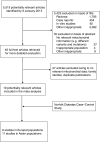The association of the mitochondrial DNA OriB variant (16184-16193 polycytosine tract) with type 2 diabetes in Europid populations
- PMID: 23702607
- PMCID: PMC3737432
- DOI: 10.1007/s00125-013-2945-6
The association of the mitochondrial DNA OriB variant (16184-16193 polycytosine tract) with type 2 diabetes in Europid populations
Abstract
Aims/hypothesis: The association between the mitochondrial DNA 16181-16193 polycytosine variant (known as the OriB variant as it maps to the OriB origin of replication) and type 2 diabetes has not been reliably characterised, with studies reporting conflicting results. We report a systematic review of published literature in Europid populations, new data from the Norfolk Diabetes Case-Control Study and a meta-analysis to help quantify this association.
Methods: We performed a systematic review identifying all the studies of the OriB variant and type 2 diabetes in Europid populations published before January 2013. We typed the OriB variant by pyrosequencing and sequencing in the Norfolk Diabetes Case-Control Study, which comprised 5,574 type 2 diabetes cases and 6,950 population-based controls.
Results: Overall, the meta-analysis included eight published studies plus the current new results, with a total of 11,794 type 2 diabetes cases and 14,465 controls. In the Norfolk Diabetes Case-Control Study, the OR for type 2 diabetes for the OriB variant was 1.09 (95% CI 0.96, 1.24). In a combined analysis, the relative risk for type 2 diabetes for the OriB variant in Europid populations was 1.10 (95% CI 1.01, 1.20; p = 0.03) CONCLUSIONS/INTERPRETATION: Results from this systematic review and meta-analysis suggest that the mitochondrial DNA OriB variant is modestly associated with an increased risk of type 2 diabetes in Europid populations, with an effect size comparable with that of recently identified variants from genome-wide association studies.
Figures
Similar articles
-
[The association of the mitochondrial DNA oriB variants with metabolic syndrome].Biomed Khim. 2017 Nov;63(6):533-538. doi: 10.18097/PBMC20176306533. Biomed Khim. 2017. PMID: 29251615 Russian.
-
A mitochondrial DNA variant at position 16189 is associated with type 2 diabetes mellitus in Asians.Diabetologia. 2008 Apr;51(4):602-8. doi: 10.1007/s00125-008-0933-z. Epub 2008 Feb 5. Diabetologia. 2008. PMID: 18251004
-
Role of the mitochondrial DNA 16184-16193 poly-C tract in type 2 diabetes.Lancet. 2005 Nov 5;366(9497):1650-1. doi: 10.1016/S0140-6736(05)67492-2. Lancet. 2005. PMID: 16271646
-
The association between the peroxisome proliferator-activated receptor-gamma2 (PPARG2) Pro12Ala gene variant and type 2 diabetes mellitus: a HuGE review and meta-analysis.Am J Epidemiol. 2010 Mar 15;171(6):645-55. doi: 10.1093/aje/kwp450. Epub 2010 Feb 23. Am J Epidemiol. 2010. PMID: 20179158 Free PMC article. Review.
-
Meta-analysis of mitochondrial T16189C polymorphism for cancer and Type 2 diabetes risk.Clin Chim Acta. 2018 Jul;482:136-143. doi: 10.1016/j.cca.2018.03.041. Epub 2018 Apr 6. Clin Chim Acta. 2018. PMID: 29627487 Review.
Cited by
-
Pathophysiology of Type 2 Diabetes in Koreans.Endocrinol Metab (Seoul). 2018 Mar;33(1):9-16. doi: 10.3803/EnM.2018.33.1.9. Endocrinol Metab (Seoul). 2018. PMID: 29589384 Free PMC article. Review.
-
mtDNA G10398A variation provides risk to type 2 diabetes in population group from the Jammu region of India.Meta Gene. 2014 Apr 13;2:269-73. doi: 10.1016/j.mgene.2014.02.003. eCollection 2014 Dec. Meta Gene. 2014. PMID: 25606409 Free PMC article.
-
Evaluation of D-loop hypervariable region I variations, haplogroups and copy number of mitochondrial DNA in Bangladeshi population with type 2 diabetes.Heliyon. 2021 Jul 15;7(7):e07573. doi: 10.1016/j.heliyon.2021.e07573. eCollection 2021 Jul. Heliyon. 2021. PMID: 34377852 Free PMC article.
-
Mitochondrial T16189C Polymorphism Is Associated with Metabolic Syndrome in the Mexican Population.Dis Markers. 2018 Mar 25;2018:3981315. doi: 10.1155/2018/3981315. eCollection 2018. Dis Markers. 2018. PMID: 29765483 Free PMC article.
-
Is Placental Mitochondrial Function a Regulator that Matches Fetal and Placental Growth to Maternal Nutrient Intake in the Mouse?PLoS One. 2015 Jul 1;10(7):e0130631. doi: 10.1371/journal.pone.0130631. eCollection 2015. PLoS One. 2015. PMID: 26132581 Free PMC article.
References
Publication types
MeSH terms
Substances
Grants and funding
LinkOut - more resources
Full Text Sources
Other Literature Sources
Medical



